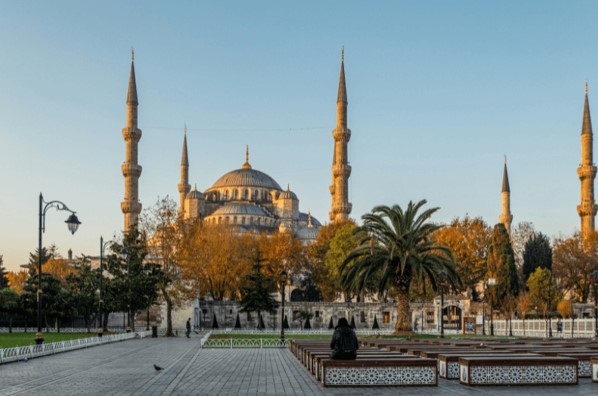After two years of disrupted travel due to ever-changing Covid-19 restrictions, airlines and tour operators are once again bracing for closed skies, cancellations and a cloud of uncertainty over international travel.
Rising fuel costs will hike travel prices
These price surges will make any type of travel more expensive. Coupled with potentially longer air routes that need more fuel as they circumvent closed Russian air space, the higher prices will eventually need to be passed on to the consumer.
A spike in fares could lead to lower demand — and that spells bad news for an industry already struggling to make up for pandemic-related losses, not to mention inflation.
Safety fears could weaken demand

Rising fuel costs will inflate passenger tickets. As will a drop in demand caused by fears of conflict.
STEFANI REYNOLDS/AFP via Getty Images
EASA doubled the size of the warning zone around Ukraine on Friday, fearing “mid-range missiles penetrating into controlled airspace.” The agency added, “in particular, there is a risk of both intentional targeting and misidentification of civil aircraft.”
For many travelers and crew already spooked by coronavirus concerns, the idea of flying anywhere near a conflict zone may be too much.
“It is likely that destinations close to Russia will suffer as consumers will fear the proximity of war, even if that is irrational, based on no declared threat from Russia,” Olivier Ponti, vice president of insights at travel analytics company ForwardKeys, told CNN.
“The US market is likely to be deterred significantly from visiting Eastern Europe and deterred, although not quite so much, from visiting western Europe,” he added.
Covid-19 still exists, and the refugee crisis could make it worse
We’re still living amid a global pandemic with country specific travel and quarantine restrictions. Travel bodies had been calling on governments to lift Covid-19 related travel restrictions as vaccinated societies hoped for some sort of return to “normal.” However, the World Health Organization warned conditions on the ground in Ukraine and the resulting refugee crisis will make it easier for coronavirus to spread.
Brian Chesky, co-founder and CEO of Airbnb, tells CNN’s Matt Egan his company is committed to helping with the refugee crisis.
“Anytime you disrupt society like this and put literally millions of people on the move, then infectious diseases will exploit that,” Dr. Mike Ryan, director of the World Health Organization’s Health Emergencies Program, said during a news briefing on Wednesday.
“People are packed together, they’re stressed, and they’re not eating, they’re not sleeping properly. They’re highly susceptible to the impacts, first of all being infected themselves. And it’s much more likely that disease will spread.”
The UNHCR says more than two million people have been forced to flee their homes and estimates “up to four million people could leave the country in the coming weeks if the conflict continues.” The effects of a potential spread of the virus in neighboring countries could make governments less likely to ease Covid-19 restrictions, which will keep the pressure on the travel industry.
Loss of tourism revenue

Turkey is among destinations experiencing extensive cancellations from Russian travelers.
Chris McGrath/Getty Images
That all changed with Russia waging war on its neighbor. Destinations which suffered the highest immediate cancellation rates over the February 24-26 period were Cyprus (300{6932ee47e64f4ce8eedbbd5224581f6531cba18a35225771c06e4f1b3f0d9667}), Egypt (234{6932ee47e64f4ce8eedbbd5224581f6531cba18a35225771c06e4f1b3f0d9667}), Turkey (153{6932ee47e64f4ce8eedbbd5224581f6531cba18a35225771c06e4f1b3f0d9667}), the UK (153{6932ee47e64f4ce8eedbbd5224581f6531cba18a35225771c06e4f1b3f0d9667}), Armenia (200{6932ee47e64f4ce8eedbbd5224581f6531cba18a35225771c06e4f1b3f0d9667}) and the Maldives (165{6932ee47e64f4ce8eedbbd5224581f6531cba18a35225771c06e4f1b3f0d9667}), data from the company shows. The absence of Russian tourists will deal a big blow to those heavily dependent tourism destinations.
No one likes uncertainty
Travel stocks are seeing their share prices tumble too. International Consolidated Airlines Group, the owner of British Airways, lost 5{6932ee47e64f4ce8eedbbd5224581f6531cba18a35225771c06e4f1b3f0d9667} in February. Shares of Lufthansa have fallen 14{6932ee47e64f4ce8eedbbd5224581f6531cba18a35225771c06e4f1b3f0d9667} since Russian forces entered Ukraine, with UK airline EasyJet painting a similar picture.
The uncertainty over what happens next in the conflict is also making people think twice about planned or existing travel plans.
“We have had customers phoning looking for reassurance that their trip will go ahead and checking our flexible booking policy,” Matt Berna, Intrepid Travel’s managing director for North America, told CNN.
“Intrepid Travel is not currently operating any tours that visit Ukraine or Russia, but in the short term, we do anticipate a softening of sales for travel in Europe,” he added.
Of course planned vacations are in no way comparable to the plight of the Ukrainian people and the immense humanitarian disaster unfolding along its borders right now, but the impact Russia’s invasion of Ukraine could have on an already fragile travel industry is one that could be felt far into the future.
Top image: The Aeroflot check-in counter at Los Angeles International Airport on March 02. Credit: Mario Tama/Getty Images




More Stories
Discover Mauritius with Travelhub: Your Trusted Tour Operator
6 Top Sights to See in Istanbul: Mosques, Palace with the World’s Largest Chandelier, and Underground Museum
Traveling to Italy for Jubilee 2025